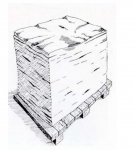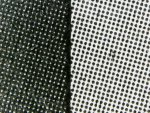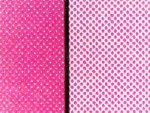gordo
Well-known member
gordo
Thank you! I have just received a basic lesson!
I mean excessive dot gain when 80% in the plate becomes 97-98% in the printout.
Yes, your point shows me an idea that I should check the dampening solution again; it seemed to be able to clean the halfttone area but not able to clean the shadow.
Your dot gain compensation curve may be wrong in the shadows or you're "in the noise" of the instrument - i.e. it's not giving you accurate readings at that tone value.
I thought someone would mention it, but the problem might be revealed in the photo of the black.
I didn't understand it so I was hoping someone smarter than me would explain it. Then I could take credit for knowing it all along ;-)
What are those lines between the dots?
Note there are many more of them in the "After" pic. They would result in a higher dot gain reading.
Normally if you have slinging/misting the ink threads would be in line with the direction of the paper through the press. But in this case they are in line with the angle of the halftone dots - which should be at 45°. This makes no sense.
As far as I can see from these photos, you have good ink lay down, no over emulsification, no ink/water issues, etc.















